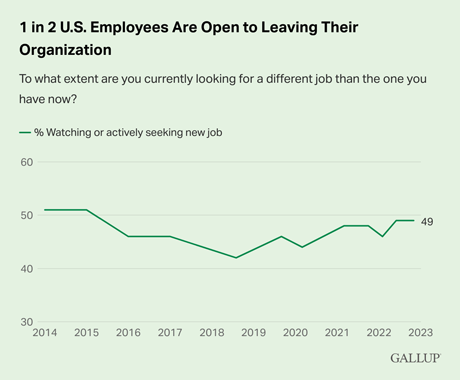Twenty-two percent of workers say they’re worried their job will become obsolete because of technology, up from 15% in 2021. And these fears aren’t unfounded: 72% of Fortune 500 CHROs foresee AI replacing jobs in their organization in the next three years.
Fears about AI are driven not only by the threat of losing one’s job, but also the uncertainty of whether they will have the skills they need to succeed in the AI era. Employees don’t want to be left behind.
But the fear of becoming obsolete doesn’t have to be an inevitability. If leaders help employees embrace AI, it can become an opportunity for boosted engagement and productivity. The key is development -- and the need to provide growth opportunities is now a core part of the AI revolution.
Why it matters
Globally, employee stress is at a record high, and AI is likely adding to it. Employees question what will happen if AI automates their job and where they’ll go next. If employers fail to address these fears, workers’ discomfort can negatively affect their engagement and productivity.
But this doesn’t mean employees are resistant to change. On the contrary: 48% of American workers say they would switch to a new job if it offered them skills training opportunities. Employees are craving the opportunity for development. Plus, 42% of employees say their most valued form of career development is training that their employer offers.
However, less than half of employees (47%) strongly agree they have the skills they need to be exceptional at their current job. And with only 2% of CHROs strongly agreeing their upskilling efforts are developing the skills their employees need for the future, workers are hungry for proactive leadership and training. If they don’t get it, they might look for another employer who can offer the development they need.
What should leaders do?
Whether leaders want to attract new talent or retain existing stars, human development is now critical to the AI revolution. By focusing on building employees’ capabilities, organizations can ensure stability during the AI transition. An emphasis on development can also enhance productivity and engagement.
Prepare workers for the change by providing training and resources to learn AI tools -- and allow employees to reskill and upskill into new roles if necessary.
No one can predict exactly how the AI revolution will unfold, and conversations about the future can feel difficult when managers don’t know what to expect. But investing in employee development is a great place to start. It can help organizations cope with the changes AI will inevitably bring, and because employees value their organization’s efforts to help them develop, they will remain loyal and motivated.
Give your employees the upskilling they want and need.
- Learn more about the advantages of investing in employee upskilling.
- Track employee attraction and retention trends over time.
- Discover how the world’s workers feel about engagement, remote work, quiet quitting and more.



